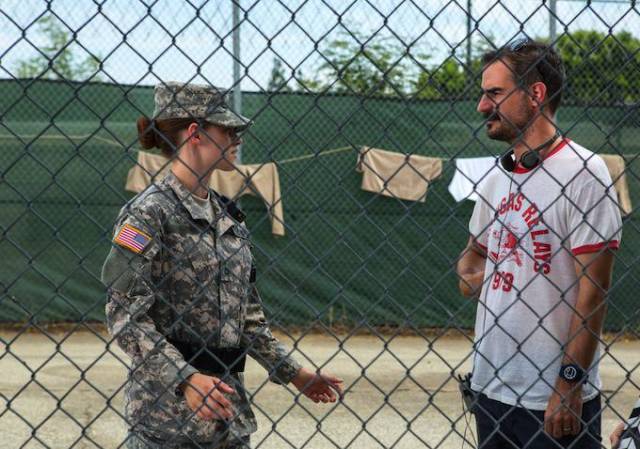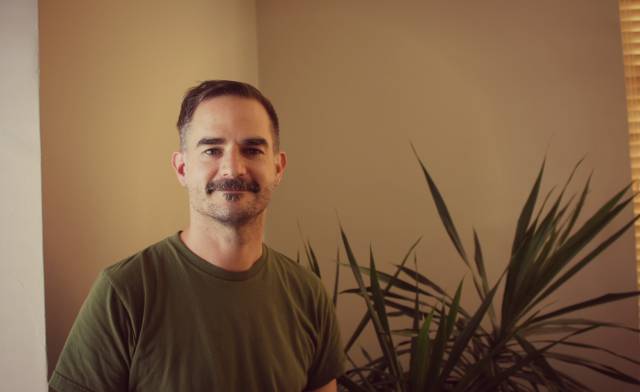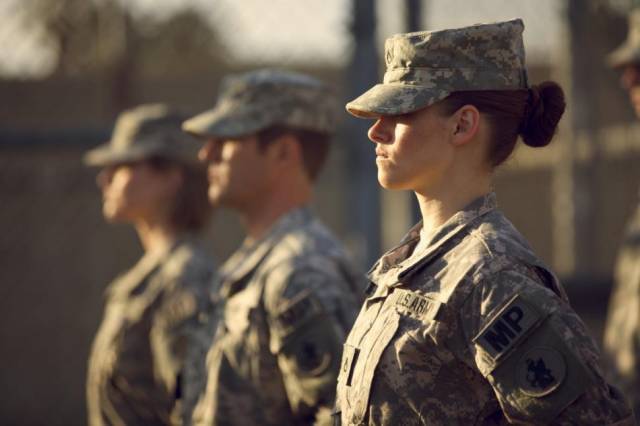

Although it's set in Guantanamo Bay Detention Camp, Camp X-Ray is unlike any post-9/11 film you've seen. Instead of focusing on the thrills of combat, the horrors of torture or the myriad issues associated with this infamous military base, it's a humanist character study that explores the sense of desperate aimlessness plaguing twenty-somethings. A revelatory Kristen Stewart stars as PFC Amy Cole, who enlists trying to give her life some meaning, she is in so much need of purpose, that not even the possibility of death seems to scare her. When she is placed as a guard in Guantanamo, she befriends Amir Ali (Peyman Moaadi), a prisoner who happens to have more in common with her than she could've imagined. They both have been extracted from their regular place in the world by unexpected causes, and while they both know they're supposed to loathe each other, their loneliness brings them together.
If the plot sounds contrived or predictable, it's nothing but a disservice to the work of writer/director Peter Sattler, who tricks us into thinking we know where the film is going, only to deliver something unexpected: an essay of quiet brilliance. He makes the most out of his actors' faces and uses very little dialogue, in the process conveying vast emotional universes that remind us how cultural and language barriers should be meaningless. A purposely apolitical film, Camp X-Ray never feels like it's preaching or trying to teach us a lesson, but it certainly makes us want to try and reach out to others after we watch it. We talked to Sattler about the themes in Camp X-Ray, directing Kristen Stewart and the cinematic references he used to construct this world.
Clouds of Sils Maria just screened at the New York Film Festival and it was great, have you seen that yet?
No, I still haven’t seen it cause Kristen won’t show me all these movies she’s been doing. I’ve also been busy, so I’ll just have to bug her to send me a copy.
You need to see it! And I’m only bringing it up because other than Adventureland and Into the Wild, everyone pretty much just associates Kristen with Twilight.
What about The Runaways, man? Don’t forget Runaways! That movie is amazing! That’s the one that I saw and I was like “whoa, this girl can act!”, cause she’s also in Panic Room and has small parts in some cool movies but when I saw Runaways I thought “she’s for real!”. I saw it years ago, but from that point on I was like “Twilight is just an aberration, this girl is cool, there’s something about her that’s really rad!”
In The Runaways though she’s really explosive, while in Camp X-Ray you have her hide inside this shell of sorts…
One of the things that Kristen’s really great at is, she has this great toughness to her but she’s also very vulnerable, and it’s that mixture of things that made me think I couldn’t not have her in the movie, because it’s perfect for this soldier that she’s playing. She has to have this tough facade because she’s a soldier, she’s surrounded by these aggressive dudes all the time so she has to keep this thick skin, but underneath it all there has to be this wound, this vulnerable child. Kristen can express that in a perfect way. She’s also an amazing actress when she doesn’t have lines, she can do so much without saying a single word. In this film she barely has any lines and all the emotion comes from her face and it’s so powerful and raw. When you catch Kristen and she’s really feeling a moment and you capture that on film it is the most magical thing on earth. It is like capturing lightning in a bottle!
I don’t know much about the army to be honest, but I found it interesting that the film is basically about a young woman who doesn’t know what to do with her life, so she decides to hide in the army, it gives her the perfect place where she doesn’t have to “be”...
That’s exactly right! I was talking about this with Kristen the other day, I think of Camp X-Ray as a quarter life crisis movie, when you’re at that stage in life when you’re getting out of college and go from being a child into becoming an adult. Many people look at the grown up world and realize things aren’t black and white, so people need to find some dogma to believe in, something to cling to, so you’re exactly right, I think this character is trying to escape herself and literally put on this soldier costume. She’s uncomfortable in her own skin so she tries another skin on. Of course in the end she realizes she needs to open up her inside and actually deal with what she’s feeling.

The film is also about globalization in a way, cause we have these two characters from opposite sides of the world, who meet by chance. How did you come up with the idea of putting these two people together?
For me the model was always movies like The Defiant Ones or Hell in the Pacific, because I love situations in which you have these two antagonistic characters that because of the environments they’re in, have to find a way to work together. The film started when I did some research and realized that these soldiers and detainees are just stuck there and they coexist in this world. Having the model of the films I mentioned, I thought this would be a perfect way to tell the story of these characters. These camps must be so weird, these people are different culturally, they’re pitted against each other, everyone is being told they should hate each other, but somehow they’re all stuck here. Both of the characters in my film are utterly lonely for some reason and so, they find this unlikely connection which saves both of them.
You also highlight how boring life in the army can be…
I’m obsessed with institutional mundanities. I also love the small idiosyncrasies of life and things like that, first of all because doing the research I realized this was real, a soldier actually told me I’d captured the 90% boredom, 10% insanity of being in the army. But we also have this image of Guantanamo Bay as being this action packed world, but in reality it’s probably just a lot of boredom and waiting around. To me this was both fascinating and relatable because in many ways this was just a crappy job, and that’s something we can all relate to, even if you haven’t been in the army.
I kept thinking about The Apartment while watching Camp X-Ray. Were you influenced at all by Billy Wilder?
I love Billy Wilder and I love The Apartment, it’s one of my wife’s favorite films actually. Things in contained spaces are always interesting to me. I love simple ideas done in complicated ways. When you can make a film about very little but it’s still so powerful, it can be the most remarkable thing in the world. It’s easy to have train crashes and special effects and dinosaurs...but if you can make two people in a room talking absolutely riveting, it blows my mind.
Your use of space in the film is fascinating, would you say your career in art direction had anything to do with this?
I was a graphic designer yeah, I’ve done every below the line job in movies, from PA, to grip...but I love film because it’s a mixture of every artform under the sun. I love graphic arts and I was doing art for movies for years and it’s definitely always influenced my eye. I adore Stanley Kubrick, he’s like my god, there’s always this balance in his work which was useful to me because my film is set in an institution and the walls need to reflect this rigidity. To do this we used handheld outside and then locked up, tight, graphically balanced shots inside just to convey the strictness of the space. Also the exploration of that space was really important, and we did some conscious things to reflect that, for example we always kept the axis on the same place, she’s always looking one way, he’s always looking the other way...we also needed for this space to feel familiar. I like movies where I understand the space where I’m in, the geography is important to me. When you walk in a room you can determine the size instantly, but in a movie sometimes you don’t know. Some action movies drive me crazy because I don’t understand what’s happening, it messes with my mind, I’m anal about that stuff. So in my movie I wanted for people to have a sense of this space, which I did by having Kristen’s character push a book cart through the whole set.

Did you ever think of making this into a play? Or were there any stage shows you used as a reference?
Actually yeah, that was part of the original idea, I figured this would be a great stage play, but then I was like “you make movies, why are you writing a play?” (laughs). I don’t watch a lot of theater, but I love Pippin, it’s a strange reference, but it’s because Pippin is a guy who wants to do something important with his life, something everyone can relate to. I adore the simplicity of having one room, and the challenge of making movement in a scene happening just through the words characters are saying. I guess more than plays, I used movies, like Compliance for example, which one of my friends made, in which everything happens in a room...and also Merry Christmas Mr. Lawrence, which was very influential to me.
The David Bowie movie?
Yeah! It’s awesome! Speaking about doing less with more, there’s an amazing shot in that film where there’s a slow zoom focusing on Ryûichi Sakamoto as he’s looking at David Bowie and I remember when I saw this film I wondered if his character was in love with David Bowie. That’s a weird thought...but then in the end he does have this conflicted love towards Bowie, but the great thing about those movies is that all that was conveyed through a simple zoom on a guy, making no facial expression. That’s freaking magic!
Speaking of love, it’s interesting that you didn’t feel the need to create a platonic romantic relationship between the two characters in your film.
This movie isn’t about romantic love, I wanted it to be something deeper. And in movies once two characters have sex, the conflict’s gone, and I always think the courting was so much cooler and exciting. In a movie essentially you’re stirring together a recipe for emotion, one of my favorite recipes is bittersweet. I don’t trust happiness to some degree, if you give something a sweet happy ending it doesn’t resonate with the real world.
But there is a lot of chemistry between Kristen and Peyman! Since you shot the movie in 21 days, how did you have time to develop this chemistry?
We had a couple weeks of rehearsal which was good, but mostly those two had an instant chemistry. Since they’re both such good actors and they’re so intelligent about film in general, not just as actors, but like filmmakers, we talked about the characters and we would hang out a lot. We built a circle of trust at the beginning. I wanted to create a cool crew where everyone trusted each other and would make the actors feel comfortable when they were doing their emotional scenes.
Going back to the military for a second, since you pretty much went through every single possible job within the hierarchy of filmmaking, I was wondering if you saw any parallels between that and the army structure?
Oh my god, yeah! That’s why I’m fascinated with both of these worlds. Trying to do anything in this world takes military precision, all the army is trying to do is make something happen. Armies aren’t about killing people, they’re about achieving goals. If your goal is to occupy a hill, they come up with a plan. And film is the same, that’s why so many assistant directors come out of the military. Our AD and one of our associate producers were in the military. Also, you’re all going on this journey together, trying to slay this beast...and yeah, with this ranking, I think when you set out to make your first film it’s interesting to have experienced what it’s like to be in all those other jobs. You learn things and when you’re in the director chair, you know how to to command this people. It’s like being a conductor too, if you know how to play everyone’s instrument, they’ll all sound better.
Camp X-Ray is now in theaters and VOD.